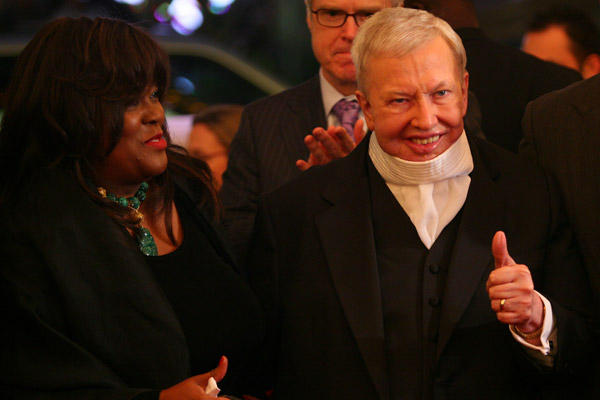
E. Jason Wambsgans/Chicago Tribune
Chaz and Roger Ebert, October 5, 2007
Roger Ebert has passed away, his longtime employer reports. It's hard to imagine—he was obviously quite sick, but it's hard to imagine it happening just a single day after taking his "leave of presence" from the Sun-Times, announced in a note that was elegiac but also vivid and alive. He was working with Steve James and Martin Scorsese on documenting his final chapter, but also Kickstarting a new version of At the Movies. If he was looking to the end, he was looking forward as well, as he had being doing so with such force so recently: while suffering through tremendous physical problems from disease and old age, his writing voice never wavered even as his physical voice disappeared, and it was constantly finding its way into new outlets, to new readers.
No one in the city, or even in journalism, wrote as much as well as Ebert did, at a pace that never wavered until yesterday. Even with the grind of movie reviewing—and, knowing movie critics, it is a grind, and it takes a unique love of the art to suffer its ongoing indignities for the medium's handful of lifechanging works of brilliance—he took time to go off on beautifully freeform flights on his blog ("Am I going on too much? I value these because they happened, and the sum of them is my lifetime."), like "A Boy, his dog, and a puddle," where Ebert the writer could play, the Ebert that chose grad school in English at the University of Chicago over journalism at Columbia, from which he got pulled back in to the eternally brief deadlines and newsholes of the latter.
This dog weighs more than the boy. At this point it has more life wisdom. It's pretending to be led. The boy considers the puddle, stoops, and carefully puts down the leash. As they first approach the puddle, the dog lists slightly to starboard, suggesting the puddle be avoided. When the boy puts down the leash, the dog takes a small step forward, suggesting they continue down the lane. The boy makes his decision. The dog turns, observes, accepts, and uses body language to say, "Don't look at me. I didn't want him to do that. It glances down at the leash and back at the puddle, guesses what will happen next, and remains in place as if the leash were fastened to the earth. It is completely accepting, and waits with content.
In the ease of his words and the depths of his knowledge, Ebert was as good as anyone at the business in understanding the internet and making his home in it, no trivial evolution for a lifelong newspaper man. In April last year, he wrote a meditation on death entitled "I remember you," as his friends began to pass away, contemplating his own death through those of others, and it reminds me a bit of what he was creating on his blog and on Twitter.
That is what death means. We exist in the minds of other people, in thousands of memory clusters, and one by one those clusters fade and disappear. Some years from now, at a funeral with a slide show, only one person will be able to say who we were. Then no one will know.
It's a beautiful phrase, "memory clusters": shadows of reality that can be summoned at a thought from the building blocks of existence and written into the future with words and images, a phrase resonant for the technology he embraced. ("And each one says, I am here and extend my consciousness to there.") So much of what Ebert did on his blog involved searching those memory clusters and casting them out into the world to create new ones; when Life Itself came out, he wrote that the desire to write an autobiography originated from his decision to blog, which "let loose the flood of memories": "Then and there, I wrote my first blog entry and began this current, probably final, stage of my life."
The final stage of his life was both a retreat into the unexplored memory clusters of his life, and also a journey into the new clusters being created in our minds and at our fingertips. May his next one be as bold and as graceful.



